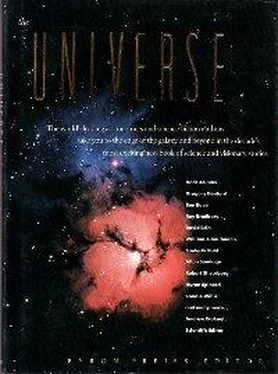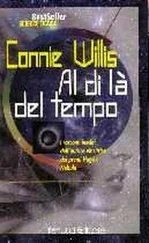Connie Willis - Schwarzschild Radius
Здесь есть возможность читать онлайн «Connie Willis - Schwarzschild Radius» весь текст электронной книги совершенно бесплатно (целиком полную версию без сокращений). В некоторых случаях можно слушать аудио, скачать через торрент в формате fb2 и присутствует краткое содержание. Год выпуска: 1987, ISBN: 1987, Издательство: Bantam Books, Жанр: Фантастика и фэнтези, на английском языке. Описание произведения, (предисловие) а так же отзывы посетителей доступны на портале библиотеки ЛибКат.
- Название:Schwarzschild Radius
- Автор:
- Издательство:Bantam Books
- Жанр:
- Год:1987
- ISBN:0-553-05227-6
- Рейтинг книги:5 / 5. Голосов: 1
-
Избранное:Добавить в избранное
- Отзывы:
-
Ваша оценка:
- 100
- 1
- 2
- 3
- 4
- 5
Schwarzschild Radius: краткое содержание, описание и аннотация
Предлагаем к чтению аннотацию, описание, краткое содержание или предисловие (зависит от того, что написал сам автор книги «Schwarzschild Radius»). Если вы не нашли необходимую информацию о книге — напишите в комментариях, мы постараемся отыскать её.
Schwarzschild Radius — читать онлайн бесплатно полную книгу (весь текст) целиком
Ниже представлен текст книги, разбитый по страницам. Система сохранения места последней прочитанной страницы, позволяет с удобством читать онлайн бесплатно книгу «Schwarzschild Radius», без необходимости каждый раз заново искать на чём Вы остановились. Поставьте закладку, и сможете в любой момент перейти на страницу, на которой закончили чтение.
Интервал:
Закладка:
Connie Willis
Schwarzschild Radius
When a star collapses, it sort of falls in on itself.” Travers curved his hand into a semicircle and then brought the fingers in. “And sometimes it reaches a kind of point of no return where the gravity pulling in on it is stronger than the nuclear and electric forces, and when it reaches that point, nothing can stop it from collapsing and it becomes a black hole.” He closed his hand into a fist. “And that critical diameter, that point where there’s no turning back, is called the Schwarzschild radius.” Travers paused, waiting for me to say something.
He had come to see me every day for a week, sitting stiffly on one of my chairs in an unaccustomed shirt and tie, and talked to me about black holes and relativity, even though I taught biology at the university before my retirement, not physics. Someone had told him I knew Schwarzschild, of course.
“The Schwarzschild radius?” I said in my quavery, old man’s voice, as if I could not remember ever hearing the phrase before, and Travers looked disgusted. He wanted me to say, “The Schwarzschild radius! Ah, yes, I served with Karl Schwarzschild on the Russian front in World War I!” and tell him all about how he had formulated his theory of black “holes while serving with the artillery, but I had not decided yet what to tell him. “The event horizon,” I said.
“Yeah. It was named after Schwarzschild because he was the one who worked out the theory,” Travers said. He reminded me of Müller with his talk of theories. He was the same age as Müller, with the same shock of stiff yellow hair and the same insatiable curiosity, and perhaps that was why I let him come every day to talk to me, though it was dangerous to let him get so close.
“I have drawn up a theory of the stars,” Müller says while we warm our hands over the Primus stove so that they will get enough feeling in them to be able to hold the liquid barretter without dropping it. “They are not balls of fire, as the scientists say. They are frozen.”
“How can we see them if they are frozen?” I say. Müller is insulted if I do not argue with him. The arguing is part of the theory.
“Look at the wireless!” he says, pointing to it sitting disemboweled on the table. We have the back off the wireless again, and in the barretter’s glass tube is a red reflection of the stove’s flame. “The light is a reflection off the ice of the star.”
“A reflection of what?”
“Of the shells, of course.”
I do not say that there were stars before there was this war, because Müller will not have an answer to this, and I have no desire to destroy his theory, and besides, I do not really believe there was a time when this war did not exist. The star shells have always exploded over the snow-covered craters of No Man’s Land, shattering in a spray of white and red, and perhaps Müller’s theory is true.
“At that point,” Travers said, “at the event horizon, no more information can be transmitted out of the black hole because gravity has become so strong, and so the collapse appears frozen at the Schwarzschild radius.”
“Frozen,” I said, thinking of Müller.
“Yeah. As a matter of fact, the Russians call black holes ‘frozen stars.’ You were at the Russian front, weren’t you?”
“What?”
“In World War I.”
“But the star doesn’t really freeze,” I said. “It goes on collapsing.”
“Yeah, sure,” Travers said. “It keeps collapsing in on itself until even the atoms are stripped of their electrons and there’s nothing left except what they call a naked singularity, but we can’t see past the Schwarzschild radius, and nobody inside a black hole can tell us what it’s like in there because they can’t get messages out, so nobody can ever know what it’s like inside a black hole.”
“I know,” I said, but he didn’t hear me.
He leaned forward. “What was it like at the front?”
It is so cold we can only work on the wireless a few minutes at a time before our hands stiffen and grow clumsy, and we are afraid of dropping the liquid barretter. Müller holds his gloves over the Primus stove and then puts them on. I jam my hands into my ice-stiff pockets.
We are fixing the wireless set. Eisner, who had been delivering messages between the sectors, got sent up to the front when he could not fix his motorcycle. If we cannot fix the wireless, we will cease to be telegraphists and become soldiers, and we will be sent to the front lines.
We are already nearly there. If it were not snowing, we could see the barbed wire and pitted snow of No Man’s Land, and the big Russian coal boxes sometimes land in the communication trenches. A shell hit our wireless hut two weeks ago. We are ahead of our own artillery lines, and some of the shells from our guns fall on us, too,because the muzzles are worn out. But it is not the front, and we guard the liquid barretter with our lives.
“Eisner’s unit was sent up on wiring fatigue last night,” Müller says, “and they have not come back. I have a theory about what happened to them.”
“Has the mail come?” I say, rubbing my sore eyes and then putting my cold hands immediately back in my pockets. I must get some new gloves, but the quartermaster has none to issue. T have written my mother three times to knit me a pair, but she has not sent them yet.
“I have a theory about Eisner’s unit,” he says doggedly. “The Russians have a magnet that has pulled them into the front.”
“Magnets pull iron, not people,” I say.
I have a theory about Müller’s theories. Littering the communications trenches are things that the soldiers going up to the front have discarded: water bottles and haversacks and bayonets. Hans and I sometimes tried to puzzle out why they would discard such important things.
“Perhaps they were too heavy,” I would say, though that did not explain the bayonets or the boots.
“Perhaps they know they are going to die,” Hans would say, picking up a helmet.
I would try to cheer him up. “My gloves fell out of my pocket yesterday when I went to the quartermaster’s. I never found them. They are in this trench somewhere.”
“Yes,” he would say, turning the helmet round and round in his hands, “perhaps as they near the front, these things simply drop away from them.”
My theory is that what happens to the water bottles and helmets and bayonets is what has happened to Müller. He was a student in university before the war, but his knowledge of science and his intelligence have fallen away from him, and now we are so close to the front, all he has left are his theories. And his curiosity, which is a dangerous thing to have kept.
“Exactly. Magnets pull iron, and they were carrying barbed wire!” he says triumphantly. “And so they were pulled in to the magnet.”
I put my hands practically into the Primus flame and rub them together, trying to get rid of the numbness. “We had better get the barretter in the wireless again or this magnet of yours will suck it to the front, too.”
I go back to the wireless. Müller stays by the stove, thinking about his magnet. The door bangs open. It is not a real door, only an iron humpie tied to the beam that reinforces the dugout and held with a wedge, and when someone pushes against it, it flies inward, bringing the snow with it.
Snow swirls in, and light, and the sound from the front, a low rumble like a dog growling. I clutch the liquid barretter to my chest, and Müller flings himself over the wireless as if it were a wounded comrade. Someone bundled in a wool coat and mittens, with a wool cap pulled over his ears, stands silhouetted against the reddish light in the doorway, blinking at us.
“Is Private Rottschieben here? I have come to see him about his eyes,” he says, and I see it is Dr. Funkenheld.
Читать дальшеИнтервал:
Закладка:
Похожие книги на «Schwarzschild Radius»
Представляем Вашему вниманию похожие книги на «Schwarzschild Radius» списком для выбора. Мы отобрали схожую по названию и смыслу литературу в надежде предоставить читателям больше вариантов отыскать новые, интересные, ещё непрочитанные произведения.
Обсуждение, отзывы о книге «Schwarzschild Radius» и просто собственные мнения читателей. Оставьте ваши комментарии, напишите, что Вы думаете о произведении, его смысле или главных героях. Укажите что конкретно понравилось, а что нет, и почему Вы так считаете.












